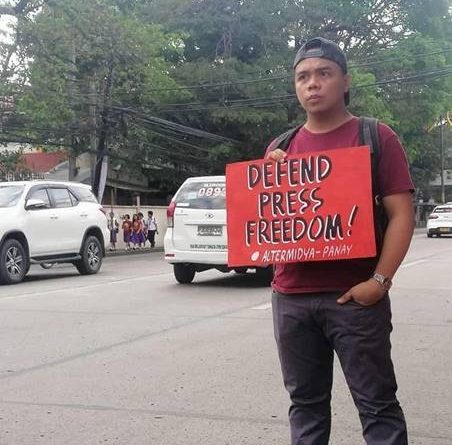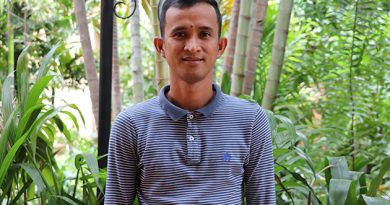Continuing state violence: Extra judicial killing of 9 indigenous people
Interview with John Ian Alenciaga,
Coordinator, Jalaur River for the People’s Movement
Member, Defend Panay Network
1. We were told that few days ago 9 Tumandok natives were killed and 16 were arrested. Please tell us more about this atrocity committed by the Philippine government.
The Philippine government has escalated its attacks against critics, dissenters, political oppositions, activists, and even the media, basically all those that the government deemed as enemies of the state. What brought these attacks are the current socio-political and economic crisis. Critics, dissenters and activists are ever more demanding what is due to the people from stopping the killings and seeking justice for all the victims, asking for economic aid from the impact of the pandemic, drivers demanding to stop the jeepney phaseout program, farmers calling to junk the Rice Liberalization Law, curbing of corruption, respect for human rights, and more. These problems constitute the worsening situation of the Filipino people under the Duterte administration.
But instead of heeding these calls for reforms and immediate relief for the people, the government instead has stepped up the campaign against counter-insurgency, blaming the five-decade long internal conflict for the hardship of the majority. As a result, there are already more than 300 activists extra-judicially killed under Duterte’s reign. The passage of the Anti-Terrorism Act of 2020 coupled with relentless terror-tagging or red-tagging has set the stage for more attacks targeting civilians in the rural communities and in urban areas. Just like the anti-drug war campaign, alleged drug users and peddlers were forced to surrender, others arrested and detained. The people subjected to these operations are then become targets and one by one they are being extra-judicially killed and on top their dead bodies are placards with slogan, “drug addict, wag tularan” (drug addict, do not follow).
This culture of impunity is now being used mainly against activists who the government accused as members or supporters of the CPP-NPA. The operations started from deploying military in rural areas to force the farmers, and indigenous peoples to surrender. Search warrants are then requested from Metro Manila from the government’s chosen judge and within 10 days, the joint operation of police and military called Synchronized Enhanced Management of Police Operations (SEMPO) is then carried out. The serving of warrants would happen at dawn between 1am to 5am while the victims are in their deep sleep. The “nanlaban” (resisted) story is then used as alibi by operatives to justify their killings. But before that, the victims were already vilified, maligned and in the case of the activists, red-tagged and labelled terrorists.###
2. We are told that your government and the Export-Import Bank of Korea are involved in the Jalaur river dam project in Panay which destroys the land and livelihood of Tumandok people. Please tell us more about this and the rights of the indigenous people in the Philippines.
The indigenous peoples Tumandok have long been struggling for their rights to their ancestral domain, and basic democratic and civil political rights. Hunger and poverty are significant problems in the communities. Farming is unstable due to natural calamities. Government neglect is prevalent as access to education and healthcare needs remain unattended.
In December 1962, then President Diosdado Macapagal declared more than 33,310 hectares of Tumandok’s ancestral lands in the municipalities of Tapaz and Jamindan in the province of Capiz as military reservation. The Tumandok were ordered to pay tumado or land rent for farming their own land. Ancestral lands in Lambunao and Calinog in Iloilo were declared forest reservations. Government allowed the conversion of farmlands into pasturelands. Tumandoks were arrested, mauled and imprisoned for continuing to farm for their livelihood.
In the 70s, the Tumandoks united and organized themselves and get involved in the struggle to end the poverty they are experiencing and to resist the exploitation and oppression by the government.
Government attacks however only escalated and during Martial law years, many Tumandok villages including the village of Lahug became “no man’s land”. Many Tumandok leaders were killed, with some beheaded by government troops.
Through the years, the Tumandoks resisted projects which they deemed as destructive in their communities. In 2011, they jumpstarted the campaign against the Jalaur mega dam project. The campaign exposed the violations of the government to the rights of indigenous peoples – non-compliance with the Free, Prior and Informed Consent, desecration of Tumandok burial sites and sacred grounds, non-compensation to damages lands and crops, threats, harassment and intimidations, bribery, and filing of trumped-up charges.
With the support from the Korean people and networks, the Tumandoks and their local support groups lobbied to the Korean Export-Import Bank, the contractor Daewoo, and a Korean government representative to stop the project but to no avail. The campaign dragged the project construction until 1st quarter of 2019.
This campaign gained the ire of the government. Those that went to South Korean were declared persona-non-grata by the municipality of Calinog. Others were red-tagged multiple times, maligned in social media, and were repeatedly mentioned by drug-personality-suspect-turned-red-tagging-government-asset Jeffrey Celiz in press conferences endangering their lives. (see the attached document)
3. The 45th UNHRC Session in last October passed Resolution 45/L.38 concerning the Pilippine human rights situation. Could you tell us more about this resolution? What are the responses from your government and civil society?
HRC Resolution 45/L.38 requests the UN High Commissioner for Human Rights and the OHCHR to provide support to the Philippines in terms of technical assistance and capacity-building in the areas of domestic investigative and accountability measures, data gathering on alleged police violations, engagement with civil society, national mechanism for reporting and follow-up, counterterrorism legislation, and human rights-based approaches to drug control.
This resolution is the HRC’s response to the OHCHR’s Report on the Situation of Human Rights in the Philippines (A/HRC/44/22) which contained a summary of the submissions made by various stakeholders reporting on systematic human rights violations, including extra-legal killings, arbitrary arrests and detention, the impunity that characterized these violations, threats to civil and political rights, and limitations on civic space. The OHCHR noted the “widespread and systematic nature of the alleged killings, and the failure of domestic mechanisms to ensure accountability.” It concluded, in part, that “persistent impunity for human rights violations is stark, and practical obstacles to accessing justice within the country are almost insurmountable.”
Significantly, the OHCHR, in its report, made a number of recommendations which were not incorporated in HRC Resolution 45/L.38. These include: (i) either rescinding or reviewing government national security and counter-insurgency policies; (ii) empowering an independent body to impartially, thoroughly, and transparently investigate extra-legal killings and violations of international humanitarian law; (iii) dropping politically-motivated charges against human rights defenders, political opposition, journalists, etc.; (iv) ensure full respect for fee, prior, and informed consent and meaningful participation at all stages of development projects that affect indigenous communities; (v) invite UN special procedures mandate holders to monitor and report on human rights concerns; and, specifically for the international community and the HRC, (vi) in the absence of clear and measurable outcomes for domestic mechanisms, consider options for international accountability measures.
HRC Resolution 45/L.38 is, thus, extremely limited and inadequate as a response to the worsening human rights situation in the Philippines. Since the resolution’s release, scores of activists and members of civil society groups have been killed, arbitrarily arrested, detained, and prosecuted based on fabricated or false evidence. The country’s armed forces and the National Task Force to End Local Communist Armed Conflict – the government body tasked to lead the counter-insurgency program – continued to spread disinformation and publicly vilify and accuse civil society groups as members or supporters of the armed underground movement. The Tumandok communities that were attacked by government forces on December 30, 2020 were similarly red-tagged and baselessly labeled as supporters of the CPP-NPA.
4. Some civic organizations like ICHRP prepares to organize “an independent body investigating the human rights“, how can we add our solidarity to this initiative?
We need to expose the atrocities of the state forces and highlight the stories of victims which counters the allegations of the government. The call for independent investigation is apt to bring into justice those culpable of massacring the Tumandok people. This will put more pressure on the government and hopefully end the culture of killings in the country.
The deadly culture of impunity has to stop. The killings and other human rights violations must be exposed in the local, national and international levels to at least put in defensive those responsible and help the bereaved families and the communities in coping up with the incident.
We call on peace loving people, indigenous people advocates, environmental activists, and human rights defenders to issue statements of condemnations and call for the stopping of killings in the Philippines. We also call for immediate independent investigations and bring to justice those responsible for the massacre.
For logistical support, Tumandoks in evacuation center are in need of medicines, foods, clothing, and sleeping mats, among others. Other needs include legal assistance for those arrested.



